翻译硕士散文精选:How Should One Read a Book
- 格式:pdf
- 大小:342.87 KB
- 文档页数:3
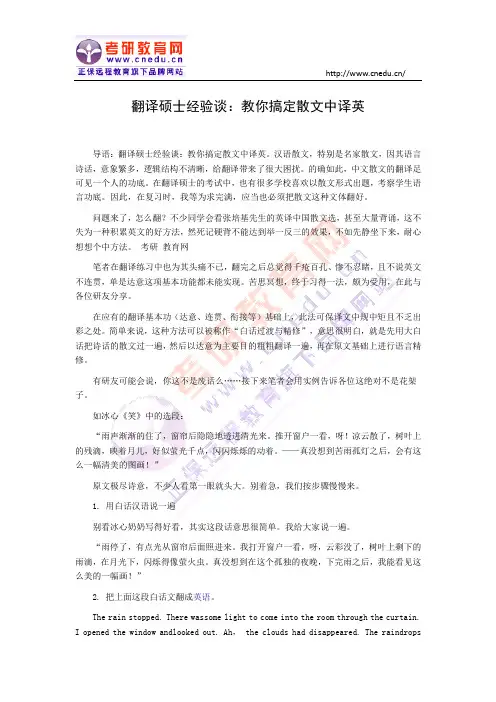
翻译硕士经验谈:教你搞定散文中译英导语:翻译硕士经验谈:教你搞定散文中译英。
汉语散文,特别是名家散文,因其语言诗话,意象繁多,逻辑结构不清晰,给翻译带来了很大困扰。
的确如此,中文散文的翻译足可见一个人的功底。
在翻译硕士的考试中,也有很多学校喜欢以散文形式出题,考察学生语言功底。
因此,在复习时,我等为求完满,应当也必须把散文这种文体翻好。
问题来了,怎么翻?不少同学会看张培基先生的英译中国散文选,甚至大量背诵,这不失为一种积累英文的好方法,然死记硬背不能达到举一反三的效果,不如先静坐下来,耐心想想个中方法。
考研教育网笔者在翻译练习中也为其头痛不已,翻完之后总觉得千疮百孔、惨不忍睹,且不说英文不连贯,单是达意这项基本功能都未能实现。
苦思冥想,终于习得一法,颇为受用,在此与各位研友分享。
在应有的翻译基本功(达意、连贯、衔接等)基础上,此法可保译文中规中矩且不乏出彩之处。
简单来说,这种方法可以被称作“白话过渡与精修”,意思很明白,就是先用大白话把诗话的散文过一遍,然后以达意为主要目的粗粗翻译一遍,再在原文基础上进行语言精修。
有研友可能会说,你这不是废话么……接下来笔者会用实例告诉各位这绝对不是花架子。
如冰心《笑》中的选段:“雨声渐渐的住了,窗帘后隐隐地透进清光来。
推开窗户一看,呀!凉云散了,树叶上的残滴,映着月儿,好似萤光千点,闪闪烁烁的动着。
——真没想到苦雨孤灯之后,会有这么一幅清美的图画!”原文极尽诗意,不少人看第一眼就头大。
别着急,我们按步骤慢慢来。
1. 用白话汉语说一遍别看冰心奶奶写得好看,其实这段话意思很简单。
我给大家说一遍。
“雨停了,有点光从窗帘后面照进来。
我打开窗户一看,呀,云彩没了,树叶上剩下的雨滴,在月光下,闪烁得像萤火虫。
真没想到在这个孤独的夜晚,下完雨之后,我能看见这么美的一幅画!”2. 把上面这段白话文翻成英语。
The rain stopped. There wassome light to come into the room through the curtain.I opened the window andlooked out. Ah, the clouds had disappeared. The raindropson the leaves, underthe moonlight, glistened like thousands of fireflies. I cannot think I couldsee such a beautiful picture after the miserable rain in a lonely night.到这里,该有人说了,你这翻得什么玩意啊,敢拿去考试吗!别着急,可不要小看这一步,最起码,它实现了翻译最基本的功能——达意。
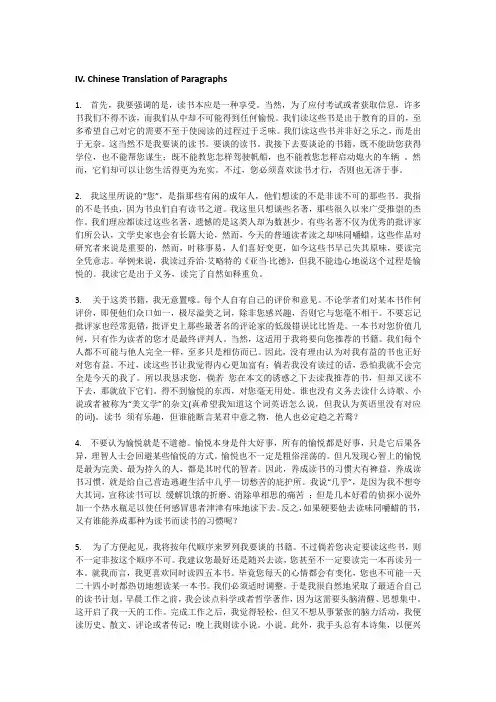
IV. Chinese Translation of Paragraphs1. 首先,我要强调的是,读书本应是一种享受。
当然,为了应付考试或者获取信息,许多书我们不得不读,而我们从中却不可能得到任何愉悦。
我们读这些书是出于教育的目的,至多希望自己对它的需要不至于使阅读的过程过于乏味。
我们读这些书并非好之乐之,而是出于无奈。
这当然不是我要谈的读书。
要谈的读书。
我接下去要谈论的书籍,既不能助您获得学位,也不能帮您谋生;既不能教您怎样驾驶帆船,也不能教您怎样启动熄火的车辆。
然而,它们却可以让您生活得更为充实。
不过,您必须喜欢读书才行,否则也无济于事。
2. 我这里所说的“您”,是指那些有闲的成年人,他们想读的不是非读不可的那些书。
我指的不是书虫,因为书虫们自有读书之道。
我这里只想谈些名著,那些很久以来广受推崇的杰作。
我们理应都读过这些名著,遗憾的是这类人却为数甚少。
有些名著不仅为优秀的批评家们所公认,文学史家也会有长篇大论,然而,今天的普通读者读之却味同嚼蜡。
这些作品对研究者来说是重要的,然而,时移事易,人们喜好变更,如今这些书早已失其原味,要读完全凭意志。
举例来说,我读过乔治·艾略特的《亚当·比德》,但我不能违心地说这个过程是愉悦的。
我读它是出于义务,读完了自然如释重负。
3. 关于这类书籍,我无意置喙。
每个人自有自己的评价和意见。
不论学者们对某本书作何评价,即便他们众口如一,极尽溢美之词,除非您感兴趣,否则它与您毫不相干。
不要忘记批评家也经常犯错,批评史上那些最著名的评论家的低级错误比比皆是。
一本书对您价值几何,只有作为读者的您才是最终评判人。
当然,这适用于我将要向您推荐的书籍。
我们每个人都不可能与他人完全一样,至多只是相仿而已。
因此,没有理由认为对我有益的书也正好对您有益。
不过,读这些书让我觉得内心更加富有;倘若我没有读过的话,恐怕我就不会完全是今天的我了。
所以我恳求您,倘若您在本文的诱惑之下去读我推荐的书,但却又读不下去,那就放下它们。
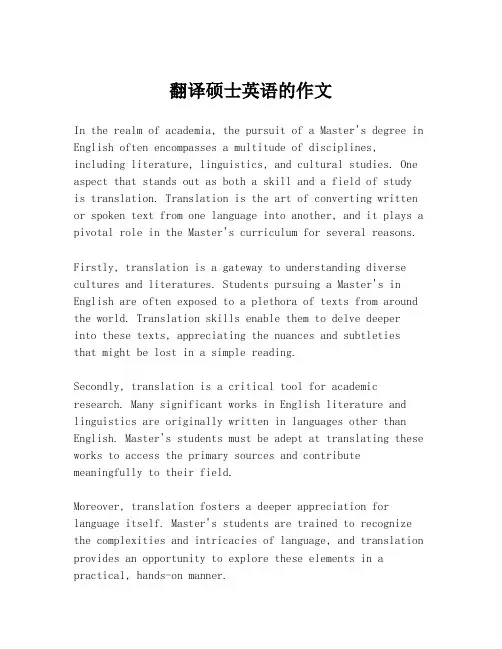
翻译硕士英语的作文In the realm of academia, the pursuit of a Master's degree in English often encompasses a multitude of disciplines, including literature, linguistics, and cultural studies. One aspect that stands out as both a skill and a field of study is translation. Translation is the art of converting written or spoken text from one language into another, and it plays a pivotal role in the Master's curriculum for several reasons.Firstly, translation is a gateway to understanding diverse cultures and literatures. Students pursuing a Master's in English are often exposed to a plethora of texts from around the world. Translation skills enable them to delve deeperinto these texts, appreciating the nuances and subtletiesthat might be lost in a simple reading.Secondly, translation is a critical tool for academic research. Many significant works in English literature and linguistics are originally written in languages other than English. Master's students must be adept at translating these works to access the primary sources and contribute meaningfully to their field.Moreover, translation fosters a deeper appreciation for language itself. Master's students are trained to recognize the complexities and intricacies of language, and translation provides an opportunity to explore these elements in a practical, hands-on manner.In addition, the process of translation encourages critical thinking and problem-solving skills. Students must navigate the challenges of conveying meaning across linguistic and cultural boundaries, which requires creativity and analytical thinking.Furthermore, translation is a professional skill that can be applied in various career paths. Graduates with a Master's in English and expertise in translation are well-suited for roles in academia, publishing, international relations, and more.Lastly, the study of translation contributes to the development of intercultural competence. In our increasingly globalized world, the ability to communicate effectively across cultures is invaluable. Master's students who specialize in translation are equipped with the skills to bridge cultural gaps and foster understanding.In conclusion, translation is not just a component of the Master's degree in English; it is a fundamental skill that enriches the academic experience, broadens career opportunities, and prepares students to navigate the complexities of our multicultural world.。
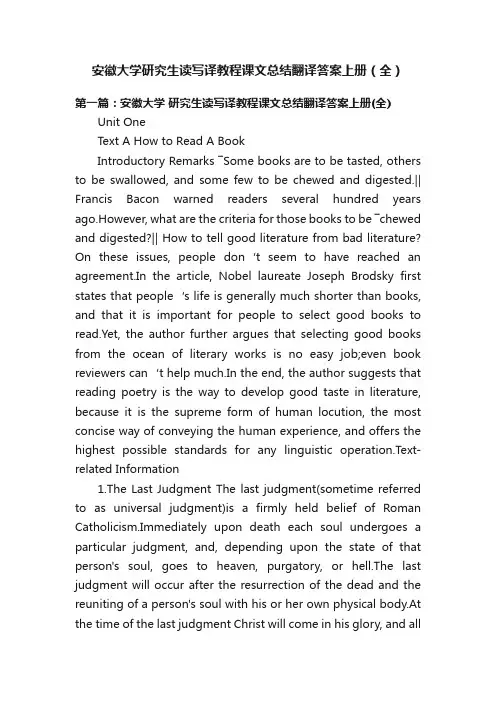
安徽大学研究生读写译教程课文总结翻译答案上册(全)第一篇:安徽大学研究生读写译教程课文总结翻译答案上册(全) Unit OneText A How to Read A BookIntroductory Remarks ―Some books are to be tasted, others to be swallowed, and some few to be chewed and digested.‖ Francis Bacon warned readers several hundred years ago.However, what are the criteria for those books to be ―chewed and digested?‖ How to tell good literature from bad literature? On these issues, people don‘t seem to have reached an agreement.In the article, Nobel laureate Joseph Brodsky first states that people‘s life is generally much shorter than books, and that it is important for people to select good books to read.Yet, the author further argues that selecting good books from the ocean of literary works is no easy job;even book reviewers can‘t help much.In the end, the author suggests that reading poetry is the way to develop good taste in literature, because it is the supreme form of human locution, the most concise way of conveying the human experience, and offers the highest possible standards for any linguistic operation.Text-related Information1.The Last Judgment The last judgment(sometime referred to as universal judgment)is a firmly held belief of Roman Catholicism.Immediately upon death each soul undergoes a particular judgment, and, depending upon the state of that person's soul, goes to heaven, purgatory, or hell.The last judgment will occur after the resurrection of the dead and the reuniting of a person's soul with his or her own physical body.At the time of the last judgment Christ will come in his glory, and allthe angels with him, and in his presence the truth of each man's relationship with God will be laid bare, and each person who has ever lived will be judged with perfect justice.Those already in heaven will remain in heaven;those already in hell will remain in hell;and those in purgatory will be released into heaven.The Roman Catholic Church holds no doctrinal position on the fate of those in Limbo.Following the last judgment, the bliss of heaven and the pains of hell will be perfected in that those present will also be capable of physical bliss/pain.After the last judgment the universe itself will be renewed with a new heaven and a new earth.2.The rhetoric “anticlimax”In rhetoric, climax is a figure of speech, in which words, phrases, or clauses are arranged in order of increasing importance.Climax comes from the Greek word for “ladder”.Examples:There are three things that will endure: faith, hope, and love.But the greatest of these is love.“I think we've reached a point of great decision, not just for our nation, not only for all humanity, but for life upon the earth.” George Wald A Generation in Search of a Future, March 4, 1969.“...Lost, vaded, broken, dead within an hour.William Shakespeare, The Passionate Pilgrim, XIII.”...the unalienable rights of life, liberty, and the pursuit of happiness.“ Martin Luther King, I Have a Dream.Similarly an anticlimax is an abrupt declension(either deliberate or unintended)on the part of a speaker or writer from the dignity of the idea which he appeared to be aiming at;as in the following well-known distich:---”The great Dalhousie, he, the god of war, Lieutenant-colonel to the earl of Mar.“An anticlimax can be intentionally employed only for ajocular or satiric purpose.It frequently partakes of the nature of antithesis, as in,”Die and endow a college or a cat.“3.Belles lettresBelles letters(from the French for literature, literally ”fine letters“)refers to literature that is appreciated for the beauty, artistry, and originality of its style and tone rather than for its ideas and informational content.Earlier the term was synonymous with literature, referring particularly to fiction, poetry, drama, criticism, and essays.However, belletristic literature has come to mean light, artificial writing and essays extolling the beauties of nguage Points1.On the whole, books are less limited than ourselves.Often they sit on the shelves absorbing dust long after the writer has turned into a handful of dust---and it is precisely the appetite for this posthumous dimension that sets one‟s pen in motion.On the whole, books have longer lives than the writers who write them.Long after the writer has died, his or her books may remain on bookshelves absorbing dust.It is due to the desire to be remembered after death that motivates the author to write continuously.2.So as we toss and turn these rectangular objects in our hands we won‟t be terribly amiss if we surmise that we fondle, as it were, the urns with our returning ashes.Therefore, when we take a book in our hands, it is not totally wrong for us to think that we are, actually, handling the urn containing our own ashes.amiss adj.: not functioning properly;e.g.A few words of introduction may not come amiss.Is there anything amiss?surmise v: infer from incomplete evidence;e.g.We surmised that he must have had an accident.There‘s so little to go on, we can only surmise what happened.n.: a message expressing an opinion based on incomplete evidencee.g.His surmise proved correct.Your first surmise was right.3.Whoever said that to philosophize is an exercise in dying was right in more ways than one, for by writing a book nobody gets younger.Some people say that to think philosophically is to experience the process of death.That is right in many aspects, as in the process of writing a book, the author only gets older and older.philosophize v.: conduct philosophical thinking;reason philosophically e.g., They spend their time philosophizing about the mysteries of life.a tendency to philosophize about racial harmony4.The paradox, however, lies in the fact that in literature “good” is defined by its distinction from “bad”.But, what seems contradictory is that in literature good works are identified by its distinction from bad works, i.e., a piece of work is good because it is not bad.5.That‟s what may constitute bad literature ‟s best defense at the Last Judgment.That may be the reason why there exist so many pieces of bad literature.6.Of course, there is no denying the pleasure of holding up with a fat, slow-moving, mediocre novel;but in the end, we read not for reading‟s sake but to learn.Of course, there is pleasure of some kind in reading a thick, lengthy and ordinary novel;but in the end, we do not read just for the sake of reading but read for learning something.there is no denying: it cannot be denied;one cannot deny the fact that e.g.There is no denying the enjoyment of a vacation after long period of hard work..There is no denying the fact that he is a faithful husband.7.Hence the need for the works that bring the human predicament into its sharpest possible focus.Hence, too, the need for some compass in the ocean of available printed matter.Therefore, we need to read works that reflect the puzzle of human beings.We also need some guidance in search of goodworks among all the books ever printed.bring … into focus: make something sharply visible;make something clear and understandable e.g.I adjusted the binoculars until I brought the bird sharply into focus.Please try to bring your major point into focus earlier in the essay.8.…he can have strong predilections for a certain kind of writing or simply be on the take with the publishing industry …he may have his own preference for a certain kind of writing or he may gain some profit from the publishing houses(by recommending books published by those publishing houses).on the take: taking or seeking to take bribes or illegal income;e.g.There were policemen on the take.The mayor is reported to have been on the take with the real estate enterprise.9.The alternative, therefore, would be to develop your own taste, to build your own compass, to familiarize yourself, as it were, with particular stars and constellations---dim or bright but always remote.Therefore, what you can do is develop your own judgment, establish your own criteria for guidance, familiarize yourself with particular authors or writers who may serve as guiders.These artists may be well or little known, but regardless they are always set apart.10.This, however, takes a hell of a lot of time and you may easily find yourself old and grey, heading for the exit with a lousy volume under your arm.However, this will take you a lot of time, so much so that when you are old and coming to the end of your life, you still cannot find the guidance for selecting good books and end up reading the ordinary ones.heading for the exit: coming to the end of one‘s lifelousy adj.: very bad;mean;contemptible;e.g.The food was lousy and there was not enough of it.He wrote only lousy poems.11.The source of the suggestion to come belongs to thecategory of people for whom literature has always been a matter of some hundred names;to the people who feel awkward at large gatherings, do not dance at parties, tend to find metaphysical excuses for adultery, and are finicky about discussing politics;the people who dislike themselves far more than their detractors do;who still prefer alcohol and tobacco to heroin or marijuana.The source of the following suggestion belongs to those people for whom literature has always been just a list of some hundred authors;to those people who feel ill at ease at large gatherings, do not dance at parties, tend to find philosophical excuses for adultery, and are fussy about discussing politics;to those people who dislike themselves even more than those who belittle them do;to those people who still prefer alcohol and tobacco to drugs.12.“one will not find on the barricades and who never shoot themselves or their lover”.―those who won‘t be found to participate in street demonstrations and who never kill themselves or their lovers‖.13.If such people occasionally find themselves swimming in their blood on the floor of prison cells or speaking from a platform, it is because they object not to some particular injustice but the order of the whole world as a whole.If those people are found to be killed in a prison or are making a public speech on a platform, that‘s not becaus e they object to any specific injustice but because they are against the general order of the whole world.14.They have no illusions about the objectivity of their views;on the contrary, they insist on their unpardonable subjectivity.They are very clear that their views are not objective, and they stick to their subjective views even though it is inexcusable to do so.15.… they consider vulnerability the primary trait of living matter.… they think that susceptibility to injury orattack is the attribute of all living things.16.This has less to do with masochistic tendencies than with their instinctive knowledge that extreme subjectivity, prejudice, and indeed idiosyncrasy are what help art to avoid cliché.This is not because they have the tendency to derive pleasure from being abused, but because they instinctively believe that extreme subjectivity, prejudice and idiosyncrasy are the best ways for art to avoid being ordinary.17.I am no union man.I do not belong to any literary association.18.The point is that being the supreme form of human locution, poetry is not only the most concise way of conveying the human experience;it also offers the highest possible standards for any linguistic operation---especially one on paper.The point is that, as the most advanced form of human language, poetry is not only the most concise way of expressing the human experience, but it also sets up the highest standards for all other language forms, especially for the written language.19.A child of epitaph and epigram, poetry is a great disciplinarian to prose.Derived from epitaph and epigram, poetry sets the standards for prose.20.It teaches the latter not only the value of each word but also the mercurial mental patterns of the species, alternatives to linear composition, the knack of omitting the self-evident, emphasis on detail, the technique of anticlimax.It teaches prose not only the value of each word but also thinking patterns outside the linear composition, techniques of omitting self-evident parts, of emphasizing the details, and of the use of anticlimax.mercurial adj.: changeable;varying e.g.a mercurial natureShe has a mercurial turn of conversation.In Roman mythology, Mercury was a messenger, and a god of trade, profit and commerce.Mercury has influenced the name of a number ofthings in a variety of scientific fields, such as the planet Mercury, and the element mercury.The word mercurial is commonly used to refer to something or someone erratic, volatile or unstable, derived from Mercury's swift flights from place to place.knack n.: a special skill, talent, or ability;e.g.a knack for making clothesHe‘s got the knack of getting people to listen.anticlimax n: a disappointing decline after a previous rise e.g.It was sad that his international career should end so anticlimactically.21.Above all, poetry develops in prose that appetite for metaphysics which distinguishes a work of art from mere belles letters.Most important of all, poetry directs prose toward the metaphysical forms, and it is in this pursuit that good literature becomes distinguished from bad literature.22.All I am trying to do is to be practical and spare your eyesight and brain cells a lot of useless printed matter.All I am trying to do is to be of some practical use to you and help you avoid those useless books.spare v.: refrain from harming;save or relieve from an experience or action e.g.I can't spare him today we need everybody here.The hotel staff spared no pains to ensure that our stay was as enjoyable as possible.It was a horrible accident---I'll spare you the details.23.All you have to do is to arm yourselves with the works of poets in your mother tongue, preferably from the first half of this century, and you will be in great shape.All you have to do is to read the works of poets in your mother tongue, especially the poets from the first half of this century, and you will gain the most from reading.be in shape: be in good health;strong and healthy;fit.e.g.Bob exercises frequently, so he's in good condition.If I were in shape, I could run faster and farther.I'm really overweight.I have to try to get into shape.24.If, after going through the works of any of these, you drop a book of prosepicked from the shelf, it won‟t be your fault.After you have read the works of any of these poets, if you cannot keep on reading a book of prose taken randomly from the bookshelf, it won‘t be your fault.(Here, the author implies thatthe prose does not measure up to the standards of the works of those poets.)25.If you continue to read it, that will be to the author‟s credit: that will mean that this author has something to add to the truth about our existence.If you can go on with the reading, the author, then, is worth reading, and it also means that this author has provided us with some truth about our lives.to sb.‟s credit: worthy of praise;in one‘s namee.g.It is greatly to your credit that you gave back the money you found;your honesty does you credit.It is to my credit to help those in want.Key to Exercises prehension 1.Often books sit on the shelves absorbing dust long after the writer has turned into a handful of dust./ Books remain on the shelves absorbing dust long after the writer has died.2.Because, according to the author, good literature is defined by its distinction from bad literature.That is to say, good literature is good because it is not bad, and bad literature is bad because it is not good.This is rather paradoxical.3.Since we are all moribund, and since reading books is time-consuming, we need a compass in the ocean of books.If we do not have such a compass, it is difficult for us to find the right books to read.4.a.he can be a hack, as ignorant as ourselves;b.he can have strong preference for a certain kind of writing or simply take bribery from the publishing house;c.he might turn his review writing into an independent art form.5.If he had been a publisher, he would be putting on the books‘ covers not only their authors‘ names but also the exactage at which they composed this or that work.By so doing, he would enable readers to decide whether they care to consider the views of a book written by a person so much younger or so much older than themselves.6.This group of people are special because literature has always been a matter of some hundred names to them, because they feel awkward at large gatherings, do not dance at parties, tend to find metaphysical excuses for adultery, and are finicky about discussing politics;because they dislike themselves far more than their detractors do;because they still prefer alcohol and tobacco to drugs.These people w on‘t participate in demonstrations, and they won‘t shoot themselves or their lovers.7.These people are unpardonably subjective in their views.8.The author suggests that the best way to develop good taste in literature is to read poetry.In the authors point of view, poetry is a great disciplinarian to prose and teaches the latter not only the value of each word but also the mercurial mental patterns of the species, alternatives to linear composition, the knack of omitting the self-evident, emphasis on detail, and the technique of anticlimax.9.If you believe in what the author says, all you have to do is to read the works of poets in your mother tongue, preferably from the first half of this century.10.It means that the book, which has added something to the truth about our existence, is worth reading.It would also mean, at the same time, that you have developed an incurable addiction to reading which is good for your life.II.Vocabulary 1.dimension 2.idiosyncratic 3.reckon 4.stance 5.lousy 6.paradox 7.debunk 8.disciplinary 9.semblance 10.vulnerableIII.Phrases 1.on the take 2.headed for 3.to his credit 4.putting…on;putting on 5.might as well 6.armed with 7.in more ways than one 8.act in IV.Error detection and correction 1.thegreatest problems 2.in which 改成 which 3.credited 改成 credited with 4.Greatly high 改成 High 5.stood改成 standing 6.any other student 7.as much 改成as many 8.Though remembered 9.considering 改成 to consider 10.that they got 改成did they getV.Cloze 1.shaped 2.desperate 3.objectivity 4.hierarchies 5.expected 6.chiefly 7.driven 8.unimpeachable 9.evaluate 10.perspective 11.industrial 12.affiliation 13.sponsors 14.support 15.acknowledgementText A 的参考译文论读书(赵亚莉译)总的来说,书本的寿命要比我们自己长。
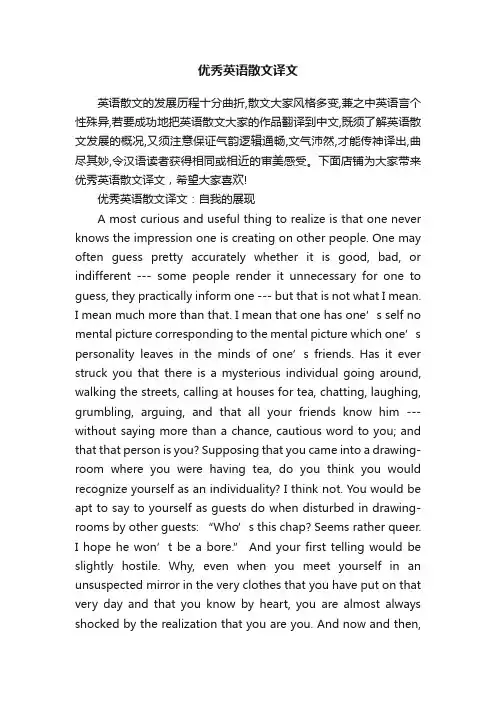
优秀英语散文译文英语散文的发展历程十分曲折,散文大家风格多变,兼之中英语言个性殊异,若要成功地把英语散文大家的作品翻译到中文,既须了解英语散文发展的概况,又须注意保证气韵逻辑通畅,文气沛然,才能传神译出,曲尽其妙,令汉语读者获得相同或相近的审美感受。
下面店铺为大家带来优秀英语散文译文,希望大家喜欢!优秀英语散文译文:自我的展现A most curious and useful thing to realize is that one never knows the impression one is creating on other people. One may often guess pretty accurately whether it is good, bad, or indifferent --- some people render it unnecessary for one to guess, they practically inform one --- but that is not what I mean.I mean much more than that. I mean that one has one’s self no mental picture corresponding to the mental picture which one’s personality leaves in the minds of one’s friends. Has it ever struck you that there is a mysterious individual going around, walking the streets, calling at houses for tea, chatting, laughing, grumbling, arguing, and that all your friends know him --- without saying more than a chance, cautious word to you; and that that person is you? Supposing that you came into a drawing-room where you were having tea, do you think you would recognize yourself as an individuality? I think not. You would be apt to say to yourself as guests do when disturbed in drawing-rooms by other guests: “Who’s this chap? Seems rather queer.I hope he won’t be a bore.” And your first telling would be slightly hostile. Why, even when you meet yourself in an unsuspected mirror in the very clothes that you have put on that very day and that you know by heart, you are almost always shocked by the realization that you are you. And now and then,when you have gone to the glass to arrange your hair in the full sobriety of early morning, have you not looked on an absolute stranger, and has not that stranger piqued your curiosity? And if it is thus with precise external details of form, colour, and movement, what may it not be with the vague complex effect of the mental and moral individuality?A man honestly tries to make a good impression. What is the result? The result merely is that his friends, in the privacy of their minds, set him down as a man who tries to make a good impression. If much depends on the result of a single interview, or a couple of interviews, a man may conceivably force another to accept an impression of himself which he would like to convey. But if the receiver of the impression is to have time at his disposal, then the giver of the impression may just as well sit down and put his hands in his pockets, for nothing that he can do will modify or influence in any way the impression that he will ultimately give. The real impress is, in the end, given unconsciously, not consciously; and further, it is received unconsciously, not consciously. It depends partly on both persons. And it is immutably fixed beforehand. There can be no final deception…一个人永远也不知道他给别人留有什么样的印象,明白这点是有益的,也是让人觉得奇怪的。
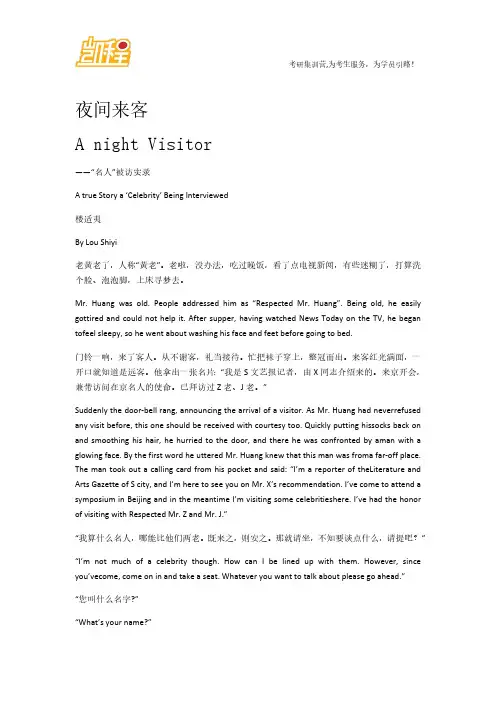
夜间来客A night Visitor——“名人”被访实录A true Story a ‘Celebrity’ Being Interviewed楼适夷By Lou Shiyi老黄老了,人称“黄老”。
老啦,没办法,吃过晚饭,看了点电视新闻,有些迷糊了,打算洗个脸、泡泡脚,上床寻梦去。
Mr. Huang was old. People addressed him as “Respected Mr. Huang”. Being old, he easily gottired and could not help it. After supper, having watched News Today on the TV, he began tofeel sleepy, so he went about washing his face and feet before going to bed.门铃一响,来了客人。
从不谢客,礼当接待。
忙把袜子穿上,整冠而出。
来客红光满面,一开口就知道是远客。
他拿出一张名片:“我是S文艺报记者,由X同志介绍来的。
来京开会,兼带访问在京名人的使命。
已拜访过Z老、J老。
”Suddenly the door-bell rang, announcing the arrival of a visitor. As Mr. Huang had neverrefused any visit before, this one should be received with courtesy too. Quickly putting hissocks back on and smoothing his hair, he hurried to the door, and there he was confronted by aman with a glowing face. By the first word he uttered Mr. Huang knew that this man was froma far-off place. The man took out a calling card from his pocket and said: “I’m a reporter of theLiterature and Arts Gazette of S city, and I’m here to see you on Mr. X’s recommendation. I’ve come to attend a symposium in Beijing and in the meantime I’m visiting some celebritieshere. I’ve had the honor of visiting with Respected Mr. Z and Mr. J.”“我算什么名人,哪能比他们两老。
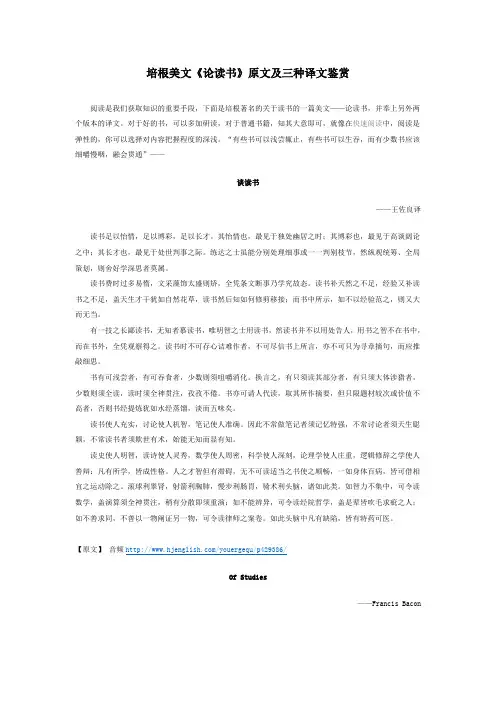
培根美文《论读书》原文及三种译文鉴赏阅读是我们获取知识的重要手段,下面是培根著名的关于读书的一篇美文——论读书,并奉上另外两个版本的译文。
对于好的书,可以多加研读,对于普通书籍,知其大意即可,就像在快速阅读中,阅读是弹性的,你可以选择对内容把握程度的深浅。
“有些书可以浅尝辄止,有些书可以生吞,而有少数书应该细嚼慢咽,融会贯通”——谈读书——王佐良译读书足以怡情,足以博彩,足以长才。
其怡情也,最见于独处幽居之时;其博彩也,最见于高谈阔论之中;其长才也,最见于处世判事之际。
练达之士虽能分别处理细事或一一判别枝节,然纵观统筹、全局策划,则舍好学深思者莫属。
读书费时过多易惰,文采藻饰太盛则矫,全凭条文断事乃学究故态。
读书补天然之不足,经验又补读书之不足,盖天生才干犹如自然花草,读书然后知如何修剪移接;而书中所示,如不以经验范之,则又大而无当。
有一技之长鄙读书,无知者慕读书,唯明智之士用读书,然读书并不以用处告人,用书之智不在书中,而在书外,全凭观察得之。
读书时不可存心诘难作者,不可尽信书上所言,亦不可只为寻章摘句,而应推敲细思。
书有可浅尝者,有可吞食者,少数则须咀嚼消化。
换言之,有只须读其部分者,有只须大体涉猎者,少数则须全读,读时须全神贯注,孜孜不倦。
书亦可请人代读,取其所作摘要,但只限题材较次或价值不高者,否则书经提炼犹如水经蒸馏,淡而五味矣。
读书使人充实,讨论使人机智,笔记使人准确。
因此不常做笔记者须记忆特强,不常讨论者须天生聪颖,不常读书者须欺世有术,始能无知而显有知。
读史使人明智,读诗使人灵秀,数学使人周密,科学使人深刻,论理学使人庄重,逻辑修辞之学使人善辩:凡有所学,皆成性格。
人之才智但有滞碍,无不可读适当之书使之顺畅,一如身体百病,皆可借相宜之运动除之。
滚球利睾肾,射箭利胸肺,慢步利肠胃,骑术利头脑,诸如此类。
如智力不集中,可令读数学,盖演算须全神贯注,稍有分散即须重演;如不能辨异,可令读经院哲学,盖是辈皆吹毛求疵之人;如不善求同,不善以一物阐证另一物,可令读律师之案卷。
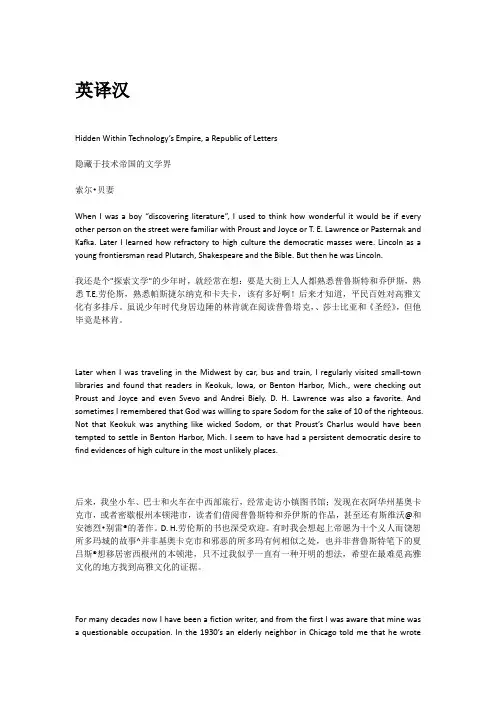
英译汉Hidden Within Technology’s Empire, a Republic of Letters隐藏于技术帝国的文学界索尔•贝妻When I was a boy “discovering literature”, I used to think how wonderful it would be if every other person on the street were familiar with Proust and Joyce or T. E. Lawrence or Pasternak and Kafka. Later I learned how refractory to high culture the democratic masses were. Lincoln as a young frontiersman read Plutarch, Shakespeare and the Bible. But then he was Lincoln.我还是个"探索文学"的少年时,就经常在想:要是大街上人人都熟悉普鲁斯特和乔伊斯,熟悉T.E.劳伦斯,熟悉帕斯捷尔纳克和卡夫卡,该有多好啊!后来才知道,平民百姓对高雅文化有多排斥。
虽说少年时代身居边陲的林肯就在阅读普鲁塔克,、莎士比亚和《圣经》,但他毕竟是林肯。
Later when I was traveling in the Midwest by car, bus and train, I regularly visited small-town libraries and found that readers in Keokuk, Iowa, or Benton Harbor, Mich., were checking out Proust and Joyce and even Svevo and Andrei Biely. D. H. Lawrence was also a favorite. And sometimes I remembered that God was willing to spare Sodom for the sake of 10 of the righteous. Not that Keokuk was anything like wicked Sodom, or that Proust’s Charlus would have been tempted to settle in Benton Harbor, Mich. I seem to have had a persistent democratic desire to find evidences of high culture in the most unlikely places.后来,我坐小车、巴士和火车在中西部旅行,经常走访小镇图书馆;发现在衣阿华州基奥卡克市,或者密歇根州本顿港市,读者们借阅普鲁斯特和乔伊斯的作品,甚至还有斯维沃@和安德烈•别雷®的著作。
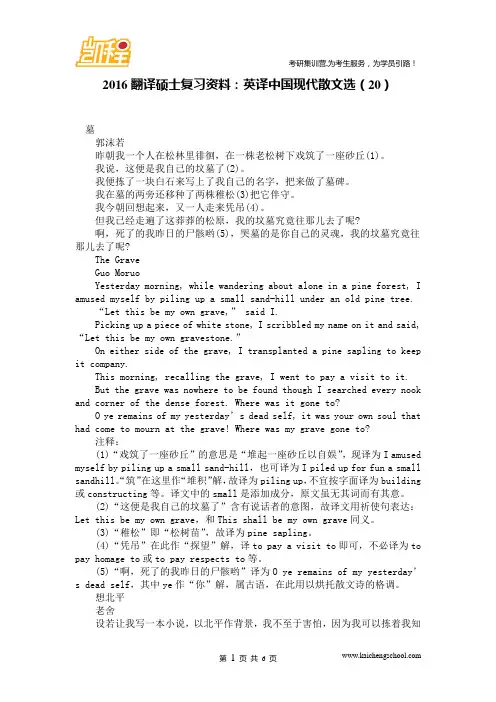
2016翻译硕士复习资料:英译中国现代散文选(20)墓郭沫若昨朝我一个人在松林里徘徊,在一株老松树下戏筑了一座砂丘(1)。
我说,这便是我自己的坟墓了(2)。
我便拣了一块白石来写上了我自己的名字,把来做了墓碑。
我在墓的两旁还移种了两株稚松(3)把它伴守。
我今朝回想起来,又一人走来凭吊(4)。
但我已经走遍了这莽莽的松原,我的坟墓究竟往那儿去了呢?啊,死了的我昨日的尸骸哟(5),哭墓的是你自己的灵魂,我的坟墓究竟往那儿去了呢?The GraveGuo MoruoYesterday morning, while wandering about alone in a pine forest, I amused myself by piling up a small sand-hill under an old pine tree.“Let this be my own grave,” said I.Picking up a piece of white stone, I scribbled my name on it and said, “Let this be my own gravestone.”On either side of the grave, I transplanted a pine sapling to keep it company.This morning, recalling the grave, I went to pay a visit to it.But the grave was nowhere to be found though I searched every nook and corner of the dense forest. Where was it gone to?O ye remains of my yesterday’s dead self, it was your own soul that had come to mourn at the grave! Where was my grave gone to?注释:(1)“戏筑了一座砂丘”的意思是“堆起一座砂丘以自娱”,现译为I amused myself by piling up a small sand-hill,也可译为I piled up for fun a small sandhill。
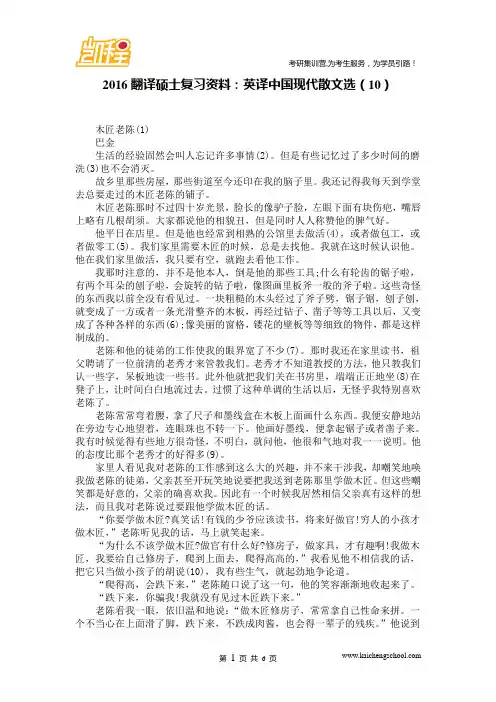
2016翻译硕士复习资料:英译中国现代散文选(10)木匠老陈(1)巴金生活的经验固然会叫人忘记许多事情(2)。
但是有些记忆过了多少时间的磨洗(3)也不会消灭。
故乡里那些房屋,那些街道至今还印在我的脑子里。
我还记得我每天到学堂去总要走过的木匠老陈的铺子。
木匠老陈那时不过四十岁光景,脸长的像驴子脸,左眼下面有块伤疤,嘴唇上略有几根胡须。
大家都说他的相貌丑,但是同时人人称赞他的脾气好。
他平日在店里。
但是他也经常到相熟的公馆里去做活(4),或者做包工,或者做零工(5)。
我们家里需要木匠的时候,总是去找他。
我就在这时候认识他。
他在我们家里做活,我只要有空,就跑去看他工作。
我那时注意的,并不是他本人,倒是他的那些工具;什么有轮齿的锯子啦,有两个耳朵的刨子啦,会旋转的钻子啦,像图画里板斧一般的斧子啦。
这些奇怪的东西我以前全没有看见过。
一块粗糙的木头经过了斧子劈,锯子锯,刨子刨,就变成了一方或者一条光滑整齐的木板,再经过钻子、凿子等等工具以后,又变成了各种各样的东西(6);像美丽的窗格,镂花的壁板等等细致的物件,都是这样制成的。
老陈和他的徒弟的工作使我的眼界宽了不少(7)。
那时我还在家里读书,祖父聘请了一位前清的老秀才来管教我们。
老秀才不知道教授的方法,他只教我们认一些字,呆板地读一些书。
此外他就把我们关在书房里,端端正正地坐(8)在凳子上,让时间白白地流过去。
过惯了这种单调的生活以后,无怪乎我特别喜欢老陈了。
老陈常常弯着腰,拿了尺子和墨线盒在木板上面画什么东西。
我便安静地站在旁边专心地望着,连眼珠也不转一下。
他画好墨线,便拿起锯子或者凿子来。
我有时候觉得有些地方很奇怪,不明白,就问他,他很和气地对我一一说明。
他的态度比那个老秀才的好得多(9)。
家里人看见我对老陈的工作感到这么大的兴趣,并不来干涉我,却嘲笑地唤我做老陈的徒弟,父亲甚至开玩笑地说要把我送到老陈那里学做木匠。
但这些嘲笑都是好意的,父亲的确喜欢我。
因此有一个时候我居然相信父亲真有这样的想法,而且我对老陈说过要跟他学做木匠的话。
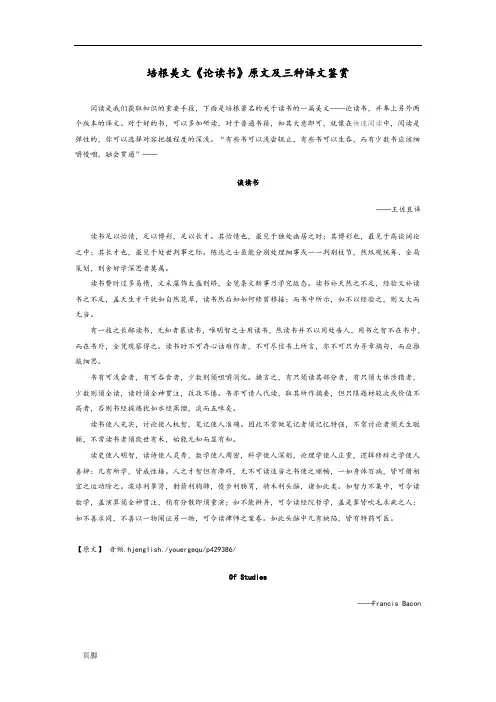
培根美文《论读书》原文及三种译文鉴赏阅读是我们获取知识的重要手段,下面是培根著名的关于读书的一篇美文——论读书,并奉上另外两个版本的译文。
对于好的书,可以多加研读,对于普通书籍,知其大意即可,就像在快速阅读中,阅读是弹性的,你可以选择对容把握程度的深浅。
“有些书可以浅尝辄止,有些书可以生吞,而有少数书应该细嚼慢咽,融会贯通”——谈读书——王佐良译读书足以怡情,足以博彩,足以长才。
其怡情也,最见于独处幽居之时;其博彩也,最见于高谈阔论之中;其长才也,最见于处世判事之际。
练达之士虽能分别处理细事或一一判别枝节,然纵观统筹、全局策划,则舍好学深思者莫属。
读书费时过多易惰,文采藻饰太盛则矫,全凭条文断事乃学究故态。
读书补天然之不足,经验又补读书之不足,盖天生才干犹如自然花草,读书然后知如何修剪移接;而书中所示,如不以经验之,则又大而无当。
有一技之长鄙读书,无知者慕读书,唯明智之士用读书,然读书并不以用处告人,用书之智不在书中,而在书外,全凭观察得之。
读书时不可存心诘难作者,不可尽信书上所言,亦不可只为寻章摘句,而应推敲细思。
书有可浅尝者,有可吞食者,少数则须咀嚼消化。
换言之,有只须读其部分者,有只须大体涉猎者,少数则须全读,读时须全神贯注,孜孜不倦。
书亦可请人代读,取其所作摘要,但只限题材较次或价值不高者,否则书经提炼犹如水经蒸馏,淡而五味矣。
读书使人充实,讨论使人机智,笔记使人准确。
因此不常做笔记者须记忆特强,不常讨论者须天生聪颖,不常读书者须欺世有术,始能无知而显有知。
读史使人明智,读诗使人灵秀,数学使人周密,科学使人深刻,论理学使人庄重,逻辑修辞之学使人善辩:凡有所学,皆成性格。
人之才智但有滞碍,无不可读适当之书使之顺畅,一如身体百病,皆可借相宜之运动除之。
滚球利睾肾,射箭利胸肺,慢步利肠胃,骑术利头脑,诸如此类。
如智力不集中,可令读数学,盖演算须全神贯注,稍有分散即须重演;如不能辨异,可令读经院哲学,盖是辈皆吹毛求疵之人;如不善求同,不善以一物阐证另一物,可令读律师之案卷。
培根美文《论读书》原文及三种译文鉴赏阅读是我们获取知识的重要手段,下面是培根著名的关于读书的一篇美文——论读书,并奉上另外两个版本的译文。
对于好的书,可以多加研读,对于普通书籍,知其大意即可,就像在中,阅读是弹性的,你可以选择对内容把握程度的深浅。
“有些书可以浅尝辄止,有些书可以生吞,而有少数书应该细嚼慢咽,融会贯通”——谈读书——王佐良译读书足以怡情,足以博彩,足以长才。
其怡情也,最见于独处幽居之时;其博彩也,最见于高谈阔论之中;其长才也,最见于处世判事之际。
练达之士虽能分别处理细事或一一判别枝节,然纵观统筹、全局策划,则舍好学深思者莫属。
读书费时过多易惰,文采藻饰太盛则矫,全凭条文断事乃学究故态。
读书补天然之不足,经验又补读书之不足,盖天生才干犹如自然花草,读书然后知如何修剪移接;而书中所示,如不以经验范之,则又大而无当。
有一技之长鄙读书,无知者慕读书,唯明智之士用读书,然读书并不以用处告人,用书之智不在书中,而在书外,全凭观察得之。
读书时不可存心诘难作者,不可尽信书上所言,亦不可只为寻章摘句,而应推敲细思。
书有可浅尝者,有可吞食者,少数则须咀嚼消化。
换言之,有只须读其部分者,有只须大体涉猎者,少数则须全读,读时须全神贯注,孜孜不倦。
书亦可请人代读,取其所作摘要,但只限题材较次或价值不高者,否则书经提炼犹如水经蒸馏,淡而五味矣。
读书使人充实,讨论使人机智,笔记使人准确。
因此不常做笔记者须记忆特强,不常讨论者须天生聪颖,不常读书者须欺世有术,始能无知而显有知。
读史使人明智,读诗使人灵秀,数学使人周密,科学使人深刻,论理学使人庄重,逻辑修辞之学使人善辩:凡有所学,皆成性格。
人之才智但有滞碍,无不可读适当之书使之顺畅,一如身体百病,皆可借相宜之运动除之。
滚球利睾肾,射箭利胸肺,慢步利肠胃,骑术利头脑,诸如此类。
如智力不集中,可令读数学,盖演算须全神贯注,稍有分散即须重演;如不能辨异,可令读经院哲学,盖是辈皆吹毛求疵之人;如不善求同,不善以一物阐证另一物,可令读律师之案卷。
英语散文阅读英语散文精选阅读英语散文的发展历程十分曲折,散文大家风格多变,兼之中英语言个性殊异,若要成功地把英语散文大家的'作品翻译到中文,既须了解英语散文发展的概况,又须注意保证气韵逻辑通畅,文气沛然,才能传神译出,曲尽其妙,令汉语读者获得相同或相近的审美感受。
下面小编为大家带来英语散文精选阅读,希望大家喜欢!英语散文精选:雨中的记忆She had been shopping with her Mom in Wal-Mart. She must have been 6 years old, this beautifulbrown haired, freckle-faced image of innocence. Itwas pouring outside. The kind of rain that gushesover the top of rain gutters, so much in a hurry tohit the Earth it has no time to flow down the spout.We all stood there under the awning and justinside the door of the Wal-Mart. We waited, some patiently, others irritated because naturemessed up their hurried day. I am always mesmerized by rainfall. I get lost in the sound andsight of the heavens washing away the dirt and dust of the world. Memories of running,splashing so carefree as a child come pouring in as a welcome reprieve from the worries of myday.Her voice was so sweet as it broke the hypnotic trance we were all caught in. "Mom, let'srun through the rain," she said."What?" Mom asked."Let's run through the rain!" She repeated."No, honey. We'll wait until it slows down a bit," Mom replied.This young child waited about another minute and repeated: "Mom, let's run through therain.""We'll get soaked if we do," Mom said."No, we won't, Mom. That's not what you said this morning,"the young girl said as shetugged at her Mom's arm."This morning? When did I say we could run through the rain and not get wet?""Don't you remember? When you were talking to Daddy about his cancer, you said, 'If Godcan get us through this, he can get us through anything!"The entire crowd stopped dead silent. I swear you couldn't hear anything but the rain. Weall stood silently. No one came or left in the next few minutes. Mom paused and thought for amoment about what she would say.Now some would laugh it off and scold her for being silly. Some might even ignore whatwas said. But this was a moment of affirmation in a young child's life. Time when innocenttrust can be nurtured so that it will bloom into faith. "Honey, you are absolutely right. Let'srun through the rain. If get wet, well maybe we just needed washing," Mom said. Then off theyran.We all stood watching, smiling and laughing as they darted past the cars and yes, throughthe puddles. They held their shopping bags over their heads just in case. They got soaked. Butthey were followedby a few who screamed and laughed like children all the way to their cars. And yes, I did. Iran. I got wet. I needed washing. Circumstances or people can take away your materialpossessions, they can take away your money, and they can take away your health. But no onecan ever take away your precious memories. So, don't forget to make time and take theopportunities to make memories every day!To everything there is a season and a time to every purpose under heaven. I hope you stilltake the time to run through the rain.英语散文精选:让我们微笑The thing that goes the farthest toward making lifeworthwhile,That costs the least and does the most, is just apleasant smile.The smile that bubbles from the heart that lovesits fellow men,Will drive away the clouds of gloom and coax thesun again.It’s full of worth and goodness, too, with manlykindness blent;It’s worth a million dollars, and it doesn’t cost acent.There is no room for sadness when we see a cheery smile;It always has the same good look; it’s never out of style;It nerves us on to try again when failure makes us blue;The dimples of encouragement are good for me and you.It pays the highest interest — for it is merely lent;It’s worth a million dollars, and it doesn’t cost a cent.A smile comes very easy — you can wrinkle up with cheer,A hundred times before you can squeeze out a salty tear;It ripples out, moreover, to the heartstrings that will tug,And always leaves an echo that is very like a hug.So, smile away! Folks understand what by a smile is meant;It’s worth a million dollars, and it doesn’t cost a cent.。
培根美文《论读书》原文及三种译文鉴赏阅读是我们获取知识的重要手段,下面是培根着名的关于读书的一篇美文——论读书,并奉上另外两个版本的译文。
对于好的书,可以多加研读,对于普通书籍,知其大意即可,就像在中,阅读是弹性的,你可以选择对内容把握程度的深浅。
“有些书可以浅尝辄止,有些书可以生吞,而有少数书应该细嚼慢咽,融会贯通”——谈读书——王佐良译读书足以怡情,足以博彩,足以长才。
其怡情也,最见于独处幽居之时;其博彩也,最见于高谈阔论之中;其长才也,最见于处世判事之际。
练达之士虽能分别处理细事或一一判别枝节,然纵观统筹、全局策划,则舍好学深思者莫属。
读书费时过多易惰,文采藻饰太盛则矫,全凭条文断事乃学究故态。
读书补天然之不足,经验又补读书之不足,盖天生才干犹如自然花草,读书然后知如何修剪移接;而书中所示,如不以经验范之,则又大而无当。
有一技之长鄙读书,无知者慕读书,唯明智之士用读书,然读书并不以用处告人,用书之智不在书中,而在书外,全凭观察得之。
读书时不可存心诘难作者,不可尽信书上所言,亦不可只为寻章摘句,而应推敲细思。
书有可浅尝者,有可吞食者,少数则须咀嚼消化。
换言之,有只须读其部分者,有只须大体涉猎者,少数则须全读,读时须全神贯注,孜孜不倦。
书亦可请人代读,取其所作摘要,但只限题材较次或价值不高者,否则书经提炼犹如水经蒸馏,淡而五味矣。
读书使人充实,讨论使人机智,笔记使人准确。
因此不常做笔记者须记忆特强,不常讨论者须天生聪颖,不常读书者须欺世有术,始能无知而显有知。
读史使人明智,读诗使人灵秀,数学使人周密,科学使人深刻,论理学使人庄重,逻辑修辞之学使人善辩:凡有所学,皆成性格。
人之才智但有滞碍,无不可读适当之书使之顺畅,一如身体百病,皆可借相宜之运动除之。
滚球利睾肾,射箭利胸肺,慢步利肠胃,骑术利头脑,诸如此类。
如智力不集中,可令读数学,盖演算须全神贯注,稍有分散即须重演;如不能辨异,可令读经院哲学,盖是辈皆吹毛求疵之人;如不善求同,不善以一物阐证另一物,可令读律师之案卷。
2016翻译硕士复习资料:英译中国现代散文选(24)谈结婚郁达夫前些日子,林语堂先生似乎曾说过(1)女子的唯一事业,是在结婚,现在一位法国大文豪来沪,对去访问他的新闻记者的谈话之中,又似乎说,男子欲成事业,应该不要结婚。
华盛顿·欧文(2)是一个独身的男子,但《见闻短记》里的一篇歌颂妻子的文章(3),却写的那么优美可爱。
同样查而斯·兰姆(4)也是独身的男子,而爱丽亚的《独身者的不平》(5)一篇,又冷嘲热讽,将结婚的男女和婚后必然的果子——小孩们——等,俏皮到了那一步田地。
究竟是结婚的好呢,还是不结婚的好?这问题似乎同先有鸡还是先有鸡蛋一样(6),常常有人提起,而也常常没有人解决过的问题(7)。
照大体看来,想租房子的时候,是无眷莫问的,想做官的时候,又是朝里无裙(8)莫做官的,想写文章的时候,是独身者(9)不能写我的妻的,凡此种种似乎都是结婚的好。
可是要想结婚,第一要有钱,第二要有闲,第三要有职,这潘驴(10)……的五个条件,却也不容易办到(11)。
更何况结婚之后,“儿子自己要来(12)”,在这世界人口过剩,经济恐慌,教育破产,世风不古的时候,万一不慎,同兰姆所说的一样,儿子们去上了断头台(13),那真是连祖宗三代的楣都要倒尽,那里还有什么“官人请!娘子请!”的唱随之乐(14)可说呢?左思右想,总觉得结婚也不好的,不结婚也是不好的。
A Chat about MarriageYu DafuThe other day, Mr. Lin Yutang said something to the effect that women’s only career lies in matrimony. Now, an eminent French writer declared at a press interview after arriving in Shanghai that men should stay bachelors if they want to achieve success in life.Washington Irving was a confirmed bachelor, but in his Sketch Book there is an article extolling the wife as a graceful and lovely life-long partner. Charles Lamb, also a single man, in A Bachelor’s Complaint of the Behaviour of Married People, one of his essays signed “Elia”, speaks mockingly of married people with their inevitable postnuptial fruits —the children. Marriage or no marriage, which is more desirable? That sounds like the chicken-and- egg question, which, though often discussed, remains a perpetual puzzle. Generally speaking, one who has no family dependants is not supposed to rent a house, one who has no petticoat influence in the government should refrain from becoming an official, an unmarried male writer is in no position to writer about “my wife”. All these seem to hint at the advantage of marriage. But, to get married, you need to have five perquisites, namely, money, leisure, employment, good looks and potentness, of which all are not always available. What is more,after your marriage, your offspring will come to this world of themselves. And in a world with overpopulation, economic crisis, educational bankruptcy and deteriorating public morals, they may, just as Charles Lamb says, through their own acts of indiscretion, be sent to the gallows. With such a terrible misfortune befalling your family, how could you still have wedded bliss to speak of?Thinking the matter over and over again, I cannot but come to the conclusion that neither matrimony nor bachelorship has anything to recommend itself.注释:郁达夫,一生短暂,在恋爱与婚姻上有很多坎坷经历。
英语散文汉译选读英语散文是一种以充满感情的文笔为特点的散文文体,属于文学作品的一种,其用语典雅,富于修辞,语言优美,句式流畅,多用以表达情感或感受,或是用以叙述或描绘生活中的经历和感受。
以下是几篇经典英语散文的汉译选读:1. On the Pleasure of Reading Books(读书的乐趣)这篇散文是英国爱德华时代的作家威廉·莫里斯所写的。
这篇散文描绘了读书所带来的快乐和成就感,表达了对阅读的热爱和敬意。
在这个喧闹的时代,读书是一种不受打扰的乐趣。
我们可以在书籍中寻找到一种安静的快乐,沉浸在思考之中。
阅读可以带给我们深度的思考,可以让我们了解历史、哲学、科学等方面的知识和智慧,可以使我们的生活更加充实和有意义。
这篇散文表达了读书的美好和重要性,强调了读书不仅是一种娱乐,更可以帮助我们成长和进步。
2. The Soul of Man under Socialism(社会主义下人的灵魂)这篇散文是爱尔兰作家奥斯卡·王尔德所写的,王尔德在本文中表达了他对社会主义的看法和对个人主义的支持。
他认为,社会应该非常重视人的自由和个性,而不应该摒弃这些东西。
王尔德认为只有在这样的环境下才能培养出真正有价值的个人。
王尔德的观点与当时的思潮截然不同,引起了不少争议。
但他的观点也启发人们思考,帮助了社会的进步和发展。
3. The Road Not Taken(未选择的路)这篇散文是罗伯特·弗罗斯特所写的一篇诗歌,也被认为具有散文的风格。
这首诗以探讨人生选择为主题,表达了人们对未来的不安和对选择的犹豫。
在这首诗中,作者提到了两条路,一条更为平坦易走,另一条崎岖不平。
在做出决定时,我们总会犹豫不决,担心自己做出的选择是否正确。
而事实上,在选择中不存在正确与错误之分,每一种选择都会给我们带来不同的经历和感受。
通过这篇诗歌,我们可以感受到人们面对人生抉择时的内心纠结和焦虑,也可以从中体会到作出正确选择的重要性。
How Should One Read a Book?怎样读书?Virginia Woolf弗吉尼亚·伍尔夫It is simple enough to say that since books have classes——fiction,biography,poetry——weshould separate them and take from each what it is right that each should give us. Yet fewpeople ask from books what books can give us. Most commonly we come to books with blurredand divided minds,asking of fiction that it shall be true,of poetry that it shall be false,ofbiography that it shall be flattering,of history that it shall enforce our own prejudices. If wecould banish all such preconceptions when we read,that would be an admirable beginning. Donot dictate to your author;Try to become him. Be his fellow-worker and accomplice. If youhang back,and reserve and criticize at first,you are preventing yourself from getting thefullest possible value from what you read. But if you open your mind as widely as possible,thesigns and hints of almost imperceptible fineness,from the twist and turn of the firstsentences,will bring you into the presence of a human being unlike any other. Steep yourselfin this,acquaint yourself with this,and soon you will find that your author is giving you,orattempting to give you,something far more definite. The thirty-two chapters of a novel—if weconsider how to read a novel first——are an attempt to make something as formed andcontrolled as a building:but words are more impalpable than bricks;Reading is a longer andmore complicated process than seeing. Perhaps the quickest way to understand the elementsof what a novelist is doing is not to read,but to write;To make your own experiment with thedangers and difficulties of words. Recall,then,some event that has left a distinct impressionon you—how at the corner of the street,perhaps,you passed two people talking. A treeshook;an electric light danced;the tone of the talk was comic,but also tragic;a wholevision;an entire conception,seemed contained in that moment.书既然有小说,传记,诗歌之分,就应区别对待,从各类书中取其应该给及我们的东西。
这话说来很简单。
然而很少有人向书索取它能给我们的东西,我们拿起书来往往怀着模糊而又杂乱的想法,要求小说是真是的,诗歌是虚假的,传记要吹捧,史书能加强我们自己的偏见。
读书时如能抛开这些先入为主之见,便是极好的开端。
不要对作者指手画脚,而要尽力与作者融为一体,共同创作,共同策划。
如果你不参与,不投入,而且一开始就百般挑剔,那你就无缘从书中获得最大的益处。
你若敞开心扉,虚怀若谷,那么,书中精细入微的寓意和暗示便会把你从一开头就碰上的那些像是山回水转般的句子中带出来,走到一个独特的人物面前。
钻进去熟悉它,你很快就会发现,作者展示给你的或想要展示给你的是一些比原先要明确得多的东西。
不妨闲来谈谈如何读小说吧。
一部长篇小说分成三十二章,是作者的苦心经营,想把它建构得如同一座错落有致的布局合理的大厦。
可是词语比砖块更难捉摸,阅读比观看更费时、更复杂。
了解作家创作的个中滋味。
最有效的途径恐怕不是读而是写,通过写亲自体验一下文字工作的艰难险阻。
回想一件你记忆忧新的事吧。
比方说,在街道的拐弯处遇到两个人正在谈话,树影婆娑,灯光摇曳,谈话的调子喜中有悲。
这一瞬间似乎包含了一种完善的意境,全面的构思。
But when you attempt to reconstruct it in words,you will find that it breaks into a thousandconflicting impressions. Some must be subdued;others emphasized;in the process you willlose,probably,all grasp upon the emotion itself. Then turn from your blurred and litteredpages to the opening pages of some great novelist—Defoe,Jane Austen,or Hardy. Now youwill be better able to appreciate their mastery. It is not merely that we are in the presence ofa different person—Defoe,Jane Austen,or Thomas Hardy—but that we are living in a differentworld. Here,in Robinson Crusoe,we are trudging a plain high road;one thing happens afteranother;the fact and the order of the fact is enough. But if the open air and adventure meaneverything to Defoe they mean nothing to Jane Austen. Hers is the drawing-room,and peopletalking,and by the many mirrors of their talk revealing their characters. And if,when we haveaccustomed ourselves to the drawing-room and its reflections,we turn to Hardy,we are oncemore spun around. The other side of the mind is now exposed—the dark side that comesuppermost in solitude,not the light side that shows in company. Our relations are nottowards people,but towards Nature and destiny. Yet different as these worlds are,each isconsistent with itself. The maker of each is careful to observe the laws of his ownperspective,and however great a strain they may put upon us they will never confuseus,as lesser writers so frequently do,by introducing two different kinds of reality into thesame book. Thus to go from one great novelist to another—from Jane Austen to Hardy,fromPeacock to Trollope,from Scott to Meredith —is to be wrenched and uprooted;to be thrownthis way and then that. To read a novel is a difficult and complex art. You must be capable notonly of great finesse of perception,but of great boldness of imagination if you are going tomake use of all that the novelist—the great artist—gives you.可是当你打算用文字来重现此情此景的时候。
它却化作千头万绪互相冲突的印象。